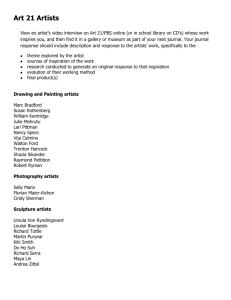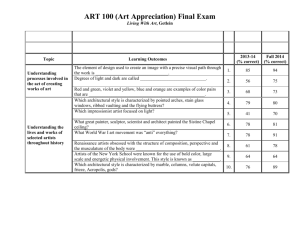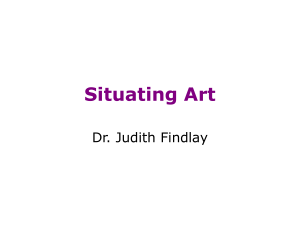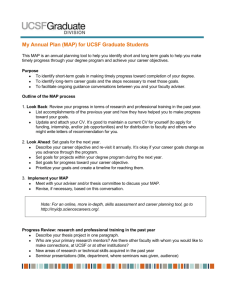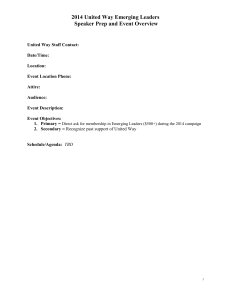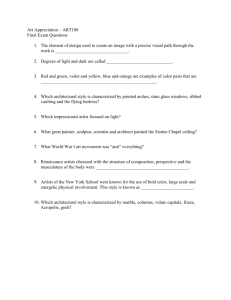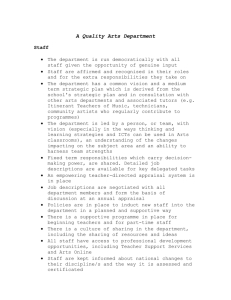Music Journeys: Pathways Through Professional Development
advertisement
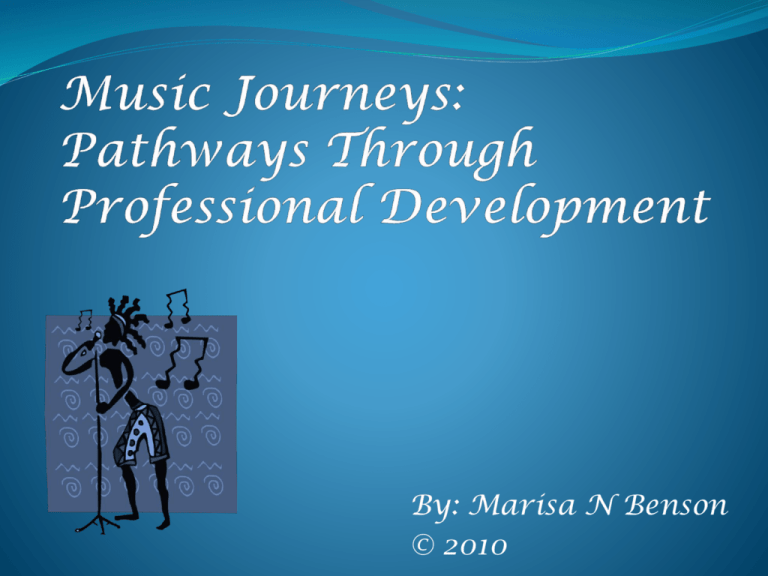
By: Marisa N Benson © 2010 What is Professional Development? Professional development is a journey to enrich one’s skills, talent and capabilities to further excel in one’s career goals. It can include academic and career-oriented education and experiences, it can be formal or informal and group based or individualized. Why is it important? Focuses on human development vs. product development Provides opportunity to create work and build new partnerships with colleagues and communities Increases quality and level of performance– musicians and music managers not only become engaged but learn new skills to become future leaders and advocates Improves accessibility to resources Keeps one up-to-date on new trends and developments Provides forums for discussion on best practices and challenges What are the Benefits? For the Musician: For the Music Manager: Empowerment to create work Create consulting work Gain financial and other Discuss best practices and resources, i.e. training, living space, etc. Expand and finely tune your technique Collaborate with fellow artists Reach new audiences and enhance their experience Networking challenges Learn the techniques and nuances of organizational management\Increase your network and access to resources Build your reputation Types of Professional Development: Residencies Fellowships Master Classes Internships Workshops Conferences Mentorships Other Resources Residencies Offer living space and may offer stipend Take place in organizations, schools and community spaces, and usually last from 3-6 months Provide opportunities to: Create new work, produce songs Create site-specific work Present and share work produced with other arts organizations and communities Collaborative music making Build Sustainable relations with institution and community Engage with media and broadcasters Master Classes Train-the-trainer classes taught by experts in the field, usually are for small number of participants Through master classes you can: Become inspired Learn technique and interpretation from an expert, hands-on Ask technical questions Receive feedback from your peers Produce collaborative work Apply what you learn in your community Workshops Hands-on experiences, at times open to the public Complementary to performances or master classes Provide opportunities to: Experiment with a range of possibilities to produce critical and challenging creative work Collaborate with peers, engage in an exchange of ideas and techniques, perform one another’s work Explore social issues through your art form Enhance your audience development strategy Use community engagement to reach new audiences, and increasing accessibility Mentorships Can have up-down, down-up, or lateral structure Last from a few weeks to a lifetime Offers participants one-on-one support Present Opportunity for: Collaborative work to be produced Your own work to be critiqued Through the mentor-mentee relationship: You can gain access to key contacts in your field Advice becomes accessible Internships Usually, range in duration from four weeks to one year Provide the opportunity to: Enhance your skills and experience Be exposed to the culture of the work environment Be engaged in work responsibilities To learn about challenges and best practices To make key contacts, and build sustainable relations with colleagues in your field Serve as a possible transition into a career Fellowships Usually one year in duration An opportunity to work on specific projects, or create your own project Enhances your resume Provides you with more extensive work responsibilities May connect you with a network of alumni, and key contacts Some fellowship programs also provide classes or oneon-one sessions that can enhance your technical knowledge and expertise Conferences and Forums An event symposium that provides a place to: Discuss best practices, and challenges Learn about new trends and developments Share information about program experience and upcoming initiatives Network with your colleagues from diverse areas Usually features: A key-note address Panel Sessions and Presentations Artist Showcases Round-table discussions Workshops Seminars What level are you in your career at this time? Are you an emerging, mid-career, or senior level professional? For professional development to be effective you should create goals and objectives and track your progress If you are an emerging leader, what goals do you plan to achieve in five to ten years? If you are a mid-career professional, what goals do you plan to achieve to rejuvenate your work? If you are a senior-level executive, what steps are you going to take to make your impact legendary? Professional Development Strategy for Emerging Leaders Create an online network of engagement Participate in master classes and workshops Get a mentor Complete internships and fellowships Create a key collaborative project Participate in a residency program Participate in an international visitor program Model Opportunities for Emerging Leaders Cultural Visitor Program Atelier Program Emerging Leaders in the Arts Network Cultural Visitor Program In the U.S. a two-three week program of professional development in which performance artists Participate in workshops, master classes Present performances, and share presentations Network with your counterparts to build sustainable partnerships Cultural Visitor Program Video This is a video of the Cultural Visitor program for hip-hop break-dancers. The program is administered by the Kennedy Center in partnership with the U.S. Department of State. Atelier – Residency Program Collaborate with artists in genres or artistic disciplines other than your own Professional artists in residency for intensive collaborative work with students and faculty Provides students with the opportunity to work on creative projects alongside important emerging artists and renowned masters Emerging Leaders in the Arts Network A list-serve for young professionals in the arts An announcement of opportunities that include: Training opportunities: workshops and master classes Networking opportunities: Discussion forums and receptions Job opportunities in the field Professional Development Strategies for Mid-Career Professionals Teach a master class Lead a workshop Supervise interns and fellows Become a key advocate for music issues Host international visitors Create collaborative work with artists from other genres/ disciplines Join a consortium Present at conferences and forums Key Opportunities for Mid-Career Professionals Cultural Envoy Program Global Encounters International Fellowships Join a consortium: International Music Managers Forum International Federation of Musicians Cultural Envoy Program Usually, two-six weeks A train-the-trainer program Focuses on addressing issues through art forms Can include master classes, workshops, performances, the production of new work, the creation of institutions (i.e. recording studios), curriculum development, and other types of outreach programming Global Encounters Program Usually six months to a year Focus on sharing world music traditions An exchange between communities, it includes: Mid-career musicians traveling to the partner country as part of the exchange, during which they: Present Master Classes for Teachers Lead workshops in high schools Work on curriculum development, specifically incorporating music studies and world cultural traditions into the social sciences Engage the students in a simultaneous distance learning concert that includes a Q&A component Global Encounters program website on U.S. – Mali Exchange http://www.carnegiehall.org/article/sound_insights/Mali/art_in tro_mali.html# International Fellowships Range from three weeks to one year. Offer opportunities to: Create your own project and see it through to fruition Participate in a shadow experience, during which you can experience a similar position to your own and see the unique challenges one faces in a different work environment and gain insight on different resources available Attend key meetings for networking and receive one-to-one feedback on challenging situations Build sustainable partnerships that can increase your access to resources Professional Development Strategy for Senior Executives/ Renowned Artists Institute professional development opportunities across your organization/ community Contribute to the design of government policy related to music Become a key fundraiser Mentor an emerging leader Participate in executive-level seminars Create a program model of excellence Write a chronicle of your experience Specific Ideas for Senior Executives/ Renowned Artists Executive Seminars Rolex Mentor and Protégé Arts Initiative Arts Management Books by Senior Executives Executive Seminars Learn ways to improve strategic planning Discuss best practices for: Leadership Retainment Board Management Effective Fundraising Creative Marketing (Institutional and Programmatic) Advocacy/ Policy Development Network with your colleagues, gain access to resources, create ideas for joint ventures Rolex Mentor and Protégé Arts Initiative One year of one-on-one mentorship Renowned masters work directly with emerging artists Aim: to build an artistic relationship Access to see the master at work Possibilility to create collaborative work Opportunity to receive a critique of one’s work Arts Management Books by Senior Executives The Art of Turnaround by Michael Kaiser, President of the John F. Kennedy Center for the Performing Arts Yours for the Asking by Reynold Levy, President, Lincoln Center for the Performing Arts Arts, Inc. by Bill Ivey, Former Chairman of the National Endowment of the Arts New Trends in Professional Development: International Digital International Visitors Programs Hosting Programs Conferences Collaborations Touring and Community Engagement Digital Webinars/ Video Conferencing Online program curriculum resources (http://artsedge.kennedy-center.org/) Social Networking Platforms List-serves, Meet-ups Online master classes (http://www.bbc.co.uk/blast/music_audio/how_tos) You are a Catalyst! Use each professional development opportunity to: Create new work! –or- Reinvent the classics! Reach out and impact your community! Collaborate with fellow artists and your audience! Create professional development opportunities in your community! Build your network! Advocate! For Further Information: Review the List of Selected Professional Development Opportunities for Musicians and Music Managers by Country Contact me anytime! Marisa N. Benson, Arts Consultant winter0100@yahoo.com
